Also in the trailer-bin, two films I’m leaning against (but you never know) and starring Zach Galiafanakis: First, as a lovable, avuncular mental patient in the trailer for Ryan Fleck and Anna Boden’s It’s Kind of a Funny Story, also with Keir Gilchrist, Emma Roberts, Viola Davis, Jeremy Davies, and Zoe Kravitz. And, for all intent and purposes, as his character in The Hangover in the Planes, Trains, and Automobiles-ish trailer for Todd Phillips’ Due Date, with Robert Downey, Jr. and Jamie Foxx. Honestly, was anything in that second trailer funny? If so, I missed it.
Tag: Zach Galifanakis
Evil Twin Theory.
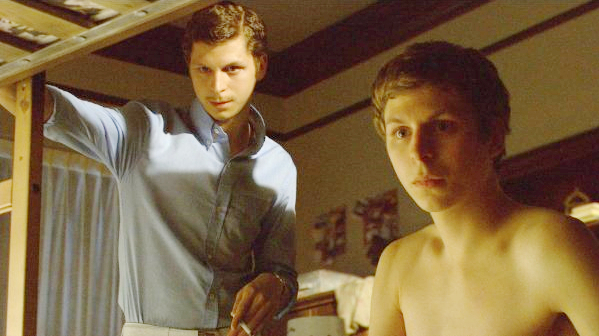
As I said back over in the Daybreakers review, my view of all three of these back-to-back-to-back movies is pretty similar — Each accomplishes what it aspires to do pretty well. If you like clever, gory, unabashed B-movies, you’ll enjoy Daybreakers. If you warm to the tics (and foibles) of Terry Gilliam unleashed, you’ll probably like The Imaginarium of Dr. Parnassus. And if you find Michael Cera and his awkward attempts to score inherently amusing, you’ll probably dig Youth in Revolt.
So, yes, this is another film in a long line of them where Cera, deeply uncomfortable in his own skin as usual, is trying to figure out What Women Want. (And, by that, I mean that, as in Superbad, he’s frantically trying to lose his virginity once more, and, as in Juno, he may or may not succeed.) The wrinkle this time is that Cera has willfully concocted his own Tyler Durden to help him out — a lascivious, mustachioed, (creepily) blue-eyed Frenchman named Francois Dillinger. In other words, imagine Cera playing both his and the Jonah Hill role in Superbad. Or, to go back to the source, just pretend George Michael had another cousin other than Maeby, and he was Gob’s kid.
So that’s the basic gist. Cera’s Nick Twisp has a few other hurdles to navigate — his mom (Jean Smart)’s worthless trucker boyfriend (Zach Galifanakis), his dad (Steve Buscemi)’s refusal to fund him, his neighbor (Fred Willard)’s general strangeness, his increasing problems with the law (as represented by cop-for-life Ray Liotta). But, mainly, he’s just trying to get to know his new girlfriend Sheeni (Portia Doubleday) a bit better. And, to do that, he’ll have to get past her uber-Christian parents (M. Emmet Walsh and Mary Kay Place), the considerable shroom collection of her older brother (Justin Long), the many impressive qualities of her other squeeze, Trent (Jonathan B. Wright), and all the long-distance problems involved. At least Nick has Francois aiding and abetting him in his shenanigans and providing that alpha-male tang when needed. But, as Nick fast discovers, there’s a reason the real Dillinger died in a hail of lead.
I know Michael Cera is verging on over-exposed right now, and I’ve also heard from several corners that people are tiring of him. Ok, fair enough. I kinda felt the same way going in, and I even skipped Nick & Nora’s Infinite Playlist and Year One. But it didn’t take long before Cera won me over again. The guy’s got impeccable comic timing, and nobody — not even Anthony Michael Hall in his prime — does awkward teen quite as well. Scott Pilgrim vs. the World aside, I’m not sure how much longer he’ll be able to milk this character — he’s getting a bit long in the tooth at this point — but he’s darn good at it. And, at least with Francois, he gets to play outside his usual sandbox for awhile.
In the end, the occasionally bawdy, mostly good-natured Youth in Revolt reminded me less of Superbad or Juno than it did the John Cusack/Savage Steve Holland teen-classics of the ’80s, Better Off Dead and One Crazy Summer. (This may be partly because, like the former, Youth in Revolt goes for the hand-drawn animated credit sequence.) And, you know what, Cusack pretty much always played the same guy back then too — you could argue he’s still doing it now. So let’s cut Cera a break already. After all, if we keep pushing him, he may up and pull a Francois and burn down the banana stand again later this year…
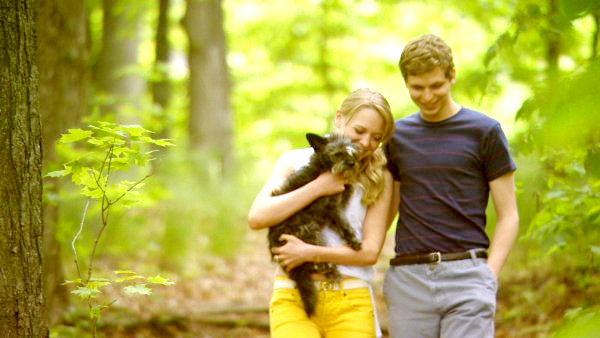
Stuck Inside of Mobile.
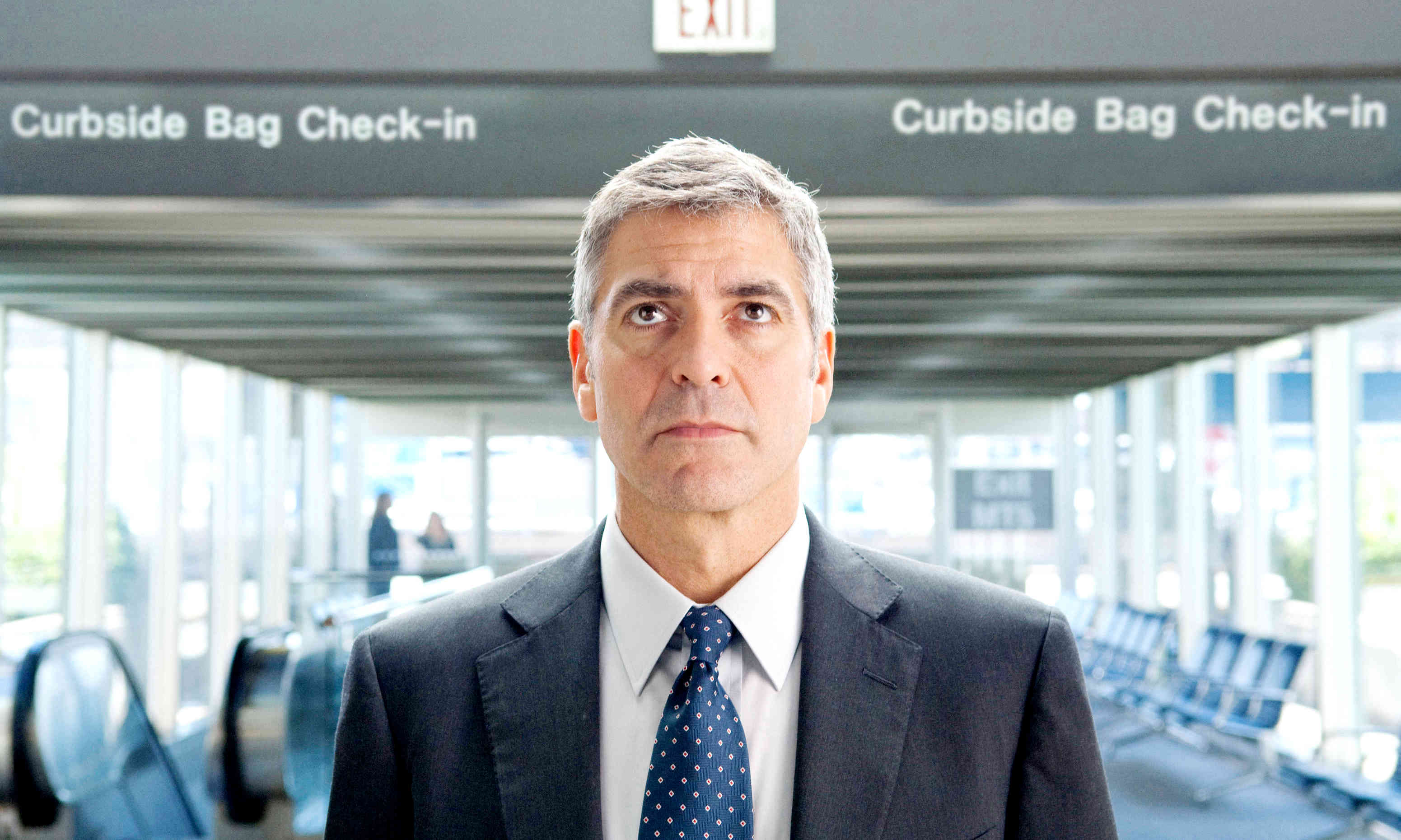
Sure, constant work-related jetsetting may have hastened Tyler Durden’s descent into borderline psychosis in Fight Club. But, if you need a second opinion, airports are the sea in which George Clooney thrives in Jason Reitman’s well-made but disappointing Up in the Air. I found it hard to pin down exactly why this movie bugged me at first, until I thought more about that memorable rant from Fight Club: “Everywhere I travel, tiny life. Single-serving sugar, single-serving cream, single pat of butter. The microwave Cordon Bleu hobby kit. Shampoo-conditioner combos, sample-packaged mouthwash, tiny bars of soap. The people I meet on each flight? They’re single-serving friends.“
And Up in the Air? It’s a single-serving movie, albeit one you might get in business class — glib, pre-packaged, wrapped in plastic, and, alas, not as tasty, nutritious, or filling as it looks. (After coming to this realization, I discovered Stephanie Zacharek felt much the same: “The picture is brushed with a fine glaze of slickness, a product sealed in a blister pack. It’s like airplane air — it has a packaged freshness that isn’t really fresh at all.“) Sure, from moment-to-moment Up in the Air is engaging enough, but sadly it all adds up to the less than the sum of its parts. (And I have a sinking feeling the Oscar of Crash, Million Dollar Baby, and Slumdog Millionaire will love it.)
Even notwithstanding an 11th hour jag that makes for a more satisfying landing than I originally suspected, there’s a lot of rote here: the obligatory wedding scene, the standard-issue epiphany in the middle of a public speech, the in vino veritas, letting-the-hair-down night among co-workers (set to not-so-Young-anymore MC); the Elliott Smith-scored nostalgic reminiscences of those days gone by, etc. etc. Up in the Air is impressively made and a Quality Production™ through-and-through, but it’s also over-stylized and curiously hollow, and it too often feels like a movie conceived by a marketing department. Imho, it needed more of that ragged, hand-crafted, DIY flair that marked the other two recent Clooney flicks this year, The Men Who Stare at Goats.
To give credit where it’s due, Up in the Air does boast one of the more memorable credit sequences I’ve seen in recent years — lovely aerial shots of the American landscape, set to a funked-up version of Woody Guthrie’s “This Land is Your Land” (by Sharon Jones and the Dap Kings.) But things get gloomy pretty quickly thereafter, with — ripped from the headlines! — a lot of people like you and me finding out that they’ve been given the axe. (Reitman apparently put out ads in Detroit and St. Louis looking for recently laid-off folks — It’s as close to home-spun as Up gets.)
Anyway, holding the handle is Ryan Bingham (Clooney): A professional firer by trade (when he’s not giving motivational speeches on the side), Bingham spends his days breaking employees the bad news so their bosses don’t have to. This job keeps him on the road pretty much constantly…which is fine by Bingham — he’s an Airportman, never happier than when he’s lounging at the American Airways VIP club, or checking into a hotel for a layover, or cruising at 50,000 feet above the heartland. (In his defense, he does live in Omaha — would you want to go home? Also, his travel experiences generally seem a lot less shoddy than almost all of the ones I can remember, but perhaps that’s a function of the miles.) In short, for Bingham transition is bliss: He’s a ship always at sea, never reaching port, and being a million miles from home only means he’s got nine million more to go.
But, naturally, new forces threaten Bingham’s airline Eden. Perhaps most importantly, his squirrelly boss (Jason Bateman) has recently made a hire out of Cornell — Natalie Keener (Anna Kendrick) — and she has the bright idea to start firing people over the Internets — Thus, no more endless junket. (To which I say, good idea! If I were getting fired either way, I don’t see how having smug-ole-George Clooney hand me a packet in person is going to improve my mood about it.) For another, his little sister (Melanie Lynskey) is getting married (Danny McBride), and their honeymoon plans (and the nagging family responsibilities they confer) make it harder for Bingham to pack light, as is his wont. And confusing the situation further, Bingham meets his female counterpart in Alex (Vera Farmiga), an eye-catching gal who shares a fondness for traveling constantly and in luxury. Does all of this mean it’s time for Ryan to put down some roots and live like the rest of us, or has he had the right idea all along?
In my Best of 2006 list, I said of Reitman’s amiable but botched take on Thank You for Smoking that “[w]hat Smoking needed was the misanthropic jolt and sense of purpose of 2005’s Lord of War, a much more successful muckraking satire…But Smoking, like its protagonist, just wants to be liked, and never truly commits to its agenda.” Well, Up in the Air has the same sense about it. I haven’t read the Walter Kirn novel this is based on, but I’m willing to bet Bingham probably comes across as more of a jerk therein. It sometimes seems that the sharp edges of this tale — “fly the unfriendly skies” and whatnot — have been filed off here. Similarly, I don’t want to give away the ending, which you deserve to experience unspoiled after sitting through the interminable high-school-nostalgia and wedding scenes. But it also feels a bit like Reitman flinched from the material in the end, or even that the finish we get isn’t the one he’d have liked to be building to.
I’m probably being harder on this film than it deserves, but if I was complaining about Cormac McCarthy’s relentless misanthropy just the other day, Up in the Air veered too far for me in the other direction. As in Reitman’s Juno, everyone’s likable and well-meaning perhaps to a fault, even when they’re acting horribly. And, when things go south, well there’s always some sugary-sweet, anesthetizing indie ballad that can soothe the pain and take you to commercial. It’s a sales job Bingham would be proud of.
Down, Up, and Over.
Since I’m behind on my movie reviews, as ever, I’m hitting up the past few summer flicks I’ve witnessed in bulk. So, in brief:
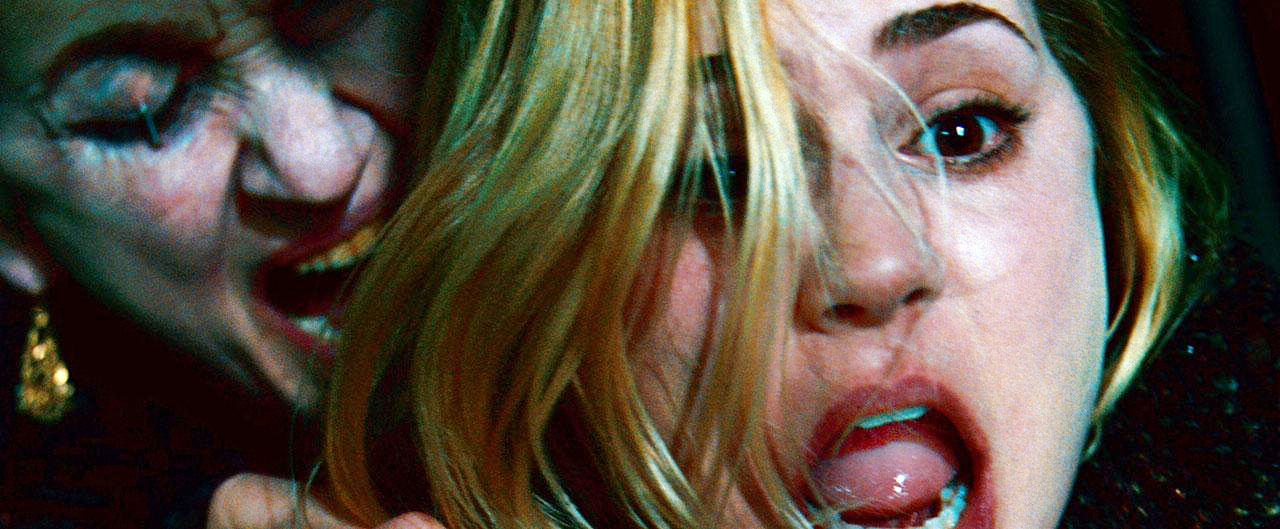
If you haven’t seen the previews, Christine Brown (Alison Lohman, quite appealing) is an ex-farm-girl trying to shake off her country roots and jump ahead a few social strata in the City of Angels, and she’s doing everything she can to be (or at least seem) upwardly mobile — she’s listening to pronunciation tapes to lose her accent, she’s foregoing sweets to keep her (newly thin) figure, she’s eyeing a promotion to assistant manager at the bank she works at, she has wildly overpaid for a trendy Mac laptop, etc. Then again, the last decision was probably forced on her, as Christine is currently dating Mac Guy (Justin Long), here Clay, a new psychology professor whose wealthy, elitist parents radiate condescension towards poor Christine. (By the way, fellow gradual students: if the kid being dragged to Hell before the opening credits didn’t tip you off that this is fantasy, the sight of Long starting a new academic job, complete with spiffy office, should do the trick. Riiiiight.)
At any rate, in her halfhearted attempts to seem ruthless enough for her bank promotion, Christine one day refuses the pleas of a sickly (re: gross) old woman (Lorna Raver) and signs off on the foreclosure of her home. Huge mistake, as this grotesque crone is actually of the gypsy persuasion — Yes, this movie is gonna make massive bank in Kazakhstan. Soon enough, after a comic brawl that involves stapled eyes and a lot of gummings, said gypsy dooms Christine to Hell. Hades. The Bad Place. And so, poor Ms. Brown only has three days — days which she will spend tormented by the lamia, a shadowy goat demon from the nefarious netherrealms — to save her soul. And, if you factor in LA ‘s infernal traffic, that’s really only two days…
One of the running jokes in Drag Me to Hell is that pretty much everybody around Christine — her boss (David Paymer), her co-worker (Reggie Lee), her gypsy nemesis, Clay’s parents, even Clay, whose warmth and sincere fondness for Christine is infused with noblesse oblige — is probably more deserving of her dire straits than she. Raimi’s film is positively Victorian in its punishing of Christine for trying to transgress class boundaries — apparently, there is no sin worse in LA than social striving. Still, pondering Drag Me to Hell‘s socioeconomic implications for any length of time is missing the point. Best to just sit back and let the blood, maggots, and embalming fluid flow. And if the elderly woman a few seats over won’t stop hacking, coughing, or chattering during the film — trust me, you’ll want to just let her do her thing.
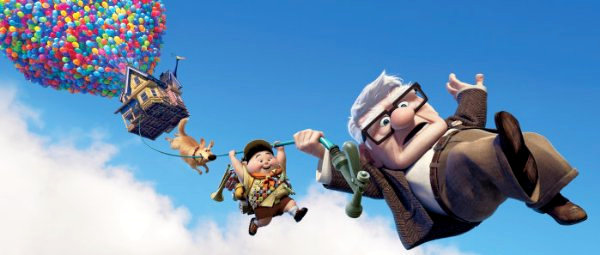
Up begins with a meet-cute between nerdy Carl (eventually, Ed Asner) and adventurous Elie (Elizabeth Docter), two youngsters who share an inordinate fondness for explorer Charles Muntz (Christopher Plummer) and his Spirit of Adventure, the zeppelin he piloted to faraway Paradise Falls, never to return. These two kids enter a pact that they will one day follow in the footsteps of their hero…but, after love, puberty, marriage, and a life well-lived, they never quite make it. By ten minutes in, Elie has passed on, Carl is now an old and curmudgeonly retiree, and their longtime house is about to be torn down by ne’er-do-well corporate developers. Knowing no gypsies, Carl takes drastic action of a different kind — he attaches several hundred helium balloons to the premises and simply floats away. And, with an inadvertent stowaway in tow — That would be Russell (Jordan Nagai), the would-be Wilderness Scout who just wants to “assist the elderly” and procure his final badge — Carl finally has that long-awaited Paradise Falls adventure, which includes but is not limited to an ill-fated reunion with Muntz, a giant bird named Kevin, and a gaggle of roaming, Bowlingual-enhanced dogs…Squirrel!
Much hilarity and occasional melancholy ensues, of course, as per the norm. But for all the film’s many strengths, I thought Up suffered from a grievous structural flaw that knocks it out of the top tier of Pixar offerings. Remember how the first forty minutes of WALL-E just overpowered the broader and more whimsical “starship fatties” half of the movie? Well, Up feels even more frontloaded. The first ten minutes or so of the film, encompassing Carl and Elie’s many decades together, is so concise and elegantly told that it just put me out of the mood for the colorful birds and talking dog hijinx that follows. Ever see the ST:TNG episode where, due to that particular week’s encounter with a cosmic energy force, Picard ends up living out an entire lifetime — marriage, kids, grandkids, and all — while only forty-five minutes passes on the Enterprise? How was he supposed to go back to the usual random shuttling back-and-forth across the Alpha Quadrant after an experience like that? Well, Up felt for me much the same. It basically peaks in the first ten minutes, as it tells the story of a lifetime, and everything thereafter — tho’ kids will probably feel different — is just a slow leaking of air.
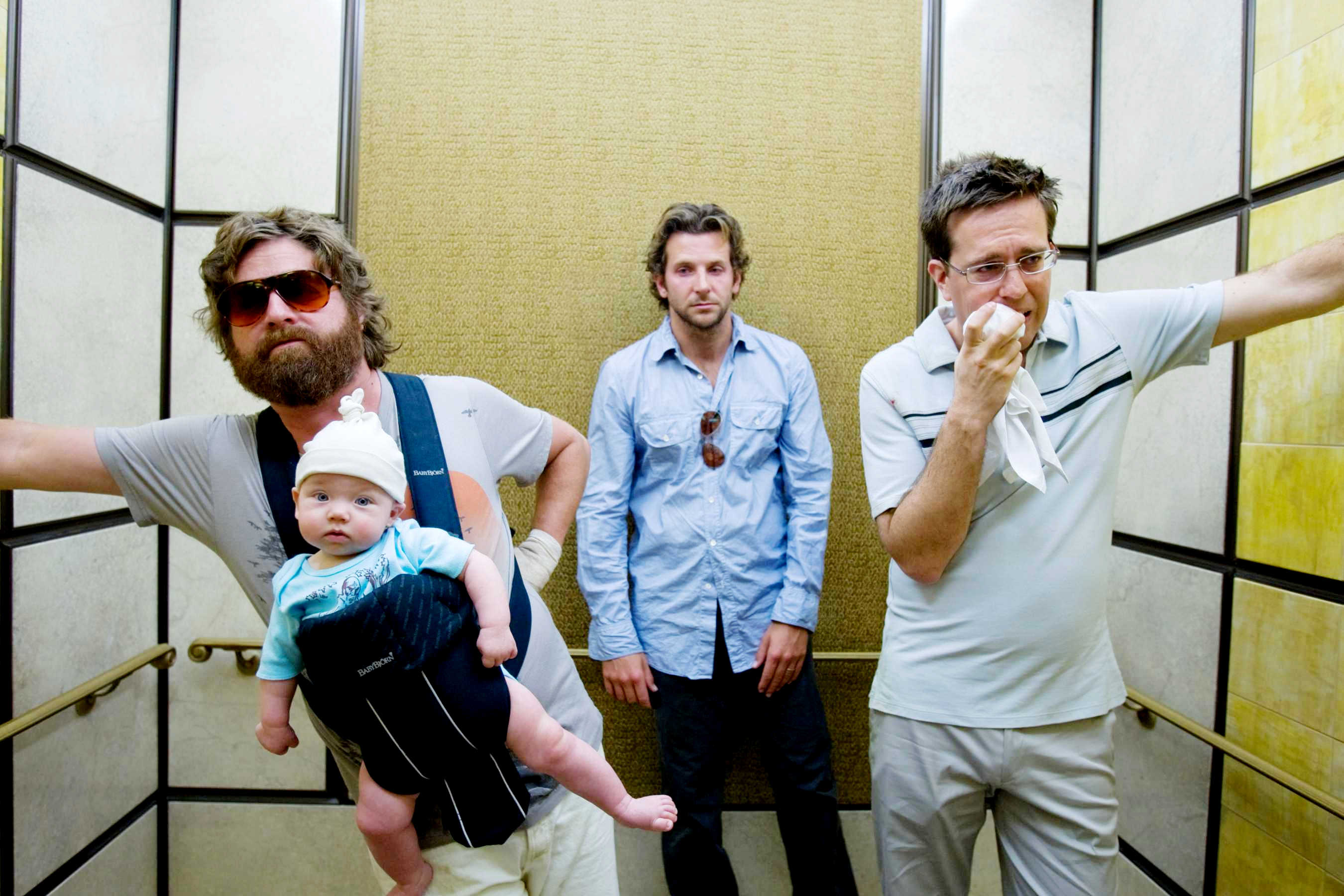
The premise of The Hangover may be the funniest thing about it. Four friends — ok, three friends and Alan, a weird deadbeat soon-to-be brother-in-law (Zack Galifianakis) — descend upon Vegas to paint the town red for a blowout bachelor party. Cut to the next day, and things have clearly gotten out of hand. Doug the groom (Justin Bartha) is nowhere to be found. Phil the lothario schoolteacher (Bradley Cooper) has a monster headache and a hospital band around his wrist. Stu the henpecked, cuckolded dentist (Ed Helms) has lost a tooth and gained a wife. And Alan can’t find his pants or his man-satchel…but has found a tiger in the bathroom and a toddler in the closet. So what the eff happened? The remaining three musketeers try to piece together clues of their Big Night and find their lost friend before zero hour in California, when Bridezilla awakens. Can they save the day in time?
The Hangover works best if you think that absolutely anything could’ve happened the night before. As it turns out, tho, most of what happened is constrained by what you’ve seen in the previews (or, barring that, the promotional materials all over the theater I was in — Heather Graham, check. Mike Tyson, check. Mike Epps, check.) And so what you’re mostly left with is a few hours of waiting for these haggard guys to tick off the next few boxes and get up to speed with the trailer. In the meantime, their company is, well, mildly entertaining, I guess, although (as in Old School) these dudes — and the sense of humor — are all a bit too mook for my taste. (If you find bare asses funny on their own terms, tho’, have at it.) A lot of the jokes revolves around Zack Galifianakis’s Alan, who’s…not quite right in the head. But, frankly, he just seems like a collection of comedy writing tics than a full-fledged character like, say, Walter Sobchak in Lebowski. What can I say? Humor is a delicate thing, and it differs for different people. But, aside from a line here or there (like the “Holocaust ring” one in the trailer), I just didn’t find The Hangover all that funny. Your mileage may vary.
Besides, on my first wild weekend in Vegas, Dubya started an unnecessary, multibillion-dollar war. Beat that for crazy.
